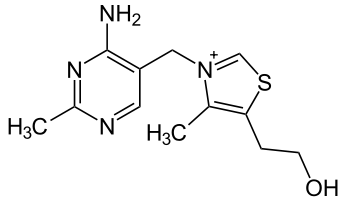Reversing Alzheimer’s
Thiamine - B1

Introduction
Thiamine is a water-soluble sulfur-containing vitamin of the B complex family.
From PubMed 23850509[1], they state in-part "considering the fact that AD patients exhibit cerebral glucose hypometabolism possibly due to impairments of insulin signaling and altered thiamine metabolism...".
Wikipedia Entry[2]
The RDA in most countries is set at about 1.4 mg. However, tests on female volunteers at daily doses of about 50 mg have claimed an increase in mental acuity.[3] There are no reports available of adverse effects from consumption of excess thiamine by ingestion of food and supplements. Because the data is inadequate for a quantitative risk assessment, no Tolerable Upper Intake Level (UL) can be derived for thiamine.
Thiamine derivatives and thiamine-dependent enzymes are present in all cells of the body, thus a thiamine deficiency would seem to adversely affect all of the organ systems. However, the nervous system is particularly sensitive to thiamine deficiency, because of its dependence on oxidative metabolism.
Note on reading the science
Wikipedia also states "Alzheimer's Disease - A review of double-blinded studies in 2000 found "no evidence that thiamine is a useful treatment for the symptoms of Alzheimer's disease".[4]"
However, if we follow the DOI link to 'The Cochrane Library' and read the article, they state 'The three included randomized controlled trials totaled less than 50 participants and insufficient detail in the results did not allow combination of the data. Thus the review found no evidence of the efficacy of thiamine for people with Alzheimer's disease.'
So, it's misleading to state Thiamine has no effect on the treatment Alzheimer's Disease. Therefore, since Thiamine is involved in sugar metabolism, it is included in 'The Protocol'.
References
- Decoding Alzheimer's disease from perturbed cerebral glucose metabolism: implications for diagnostic and therapeutic strategies.
- http://en.wikipedia.org/wiki/Thiamine
- Thiamine's Mood-Mending Qualities, Richard N. Podel, Nutrition Science News, January 1999.
- Rodríguez-Martín, JL; Qizilbash, N; López-Arrieta, JM (2001). Rodríguez, José-Luis, ed. "Thiamine for Alzheimer's disease".Cochrane Database Syst Rev. 2 (2): CD001498. doi:10.1002/14651858.CD001498. PMID 11405995.